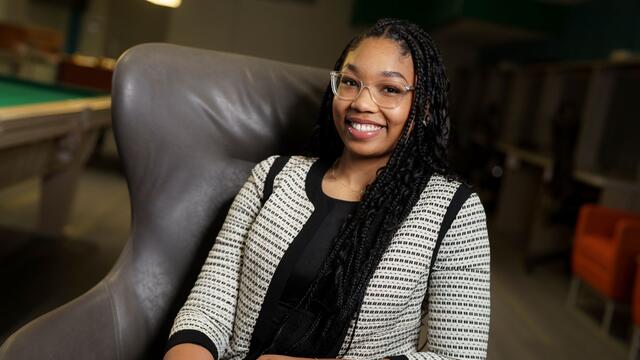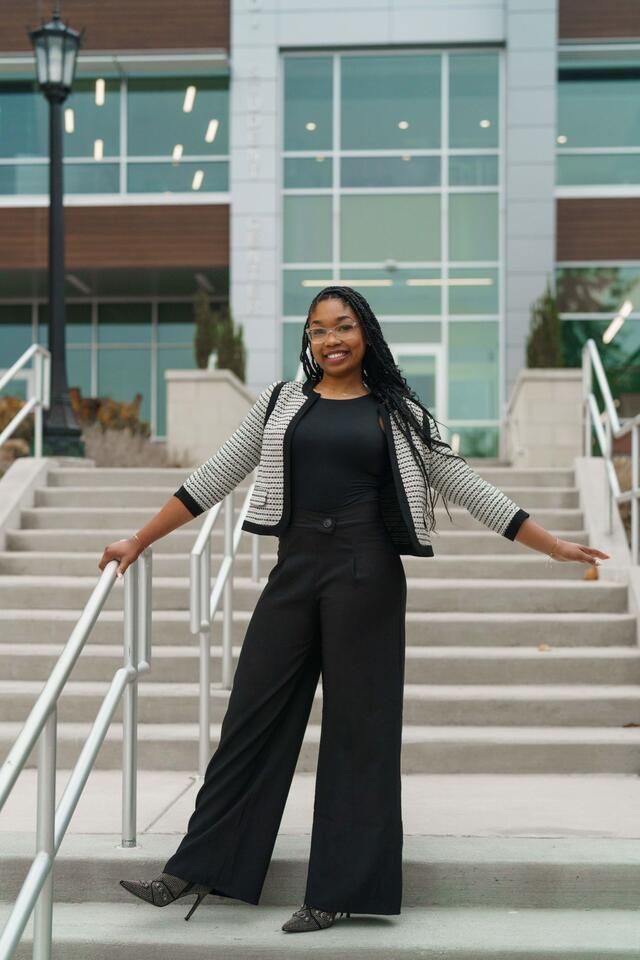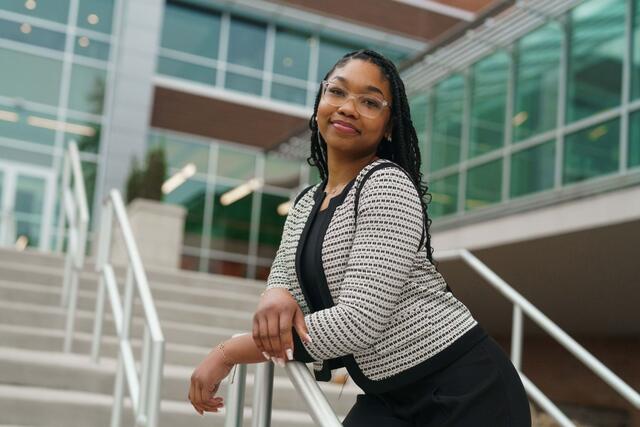Class of 2025: Nakayla Lawson
Through her extensive laboratory experience at McDaniel, Nakayla Lawson advanced to become a mentor in the lab to her fellow researchers. After scuba diving on a Marine Biology Jan Term trip and volunteering at the University of Maryland Medical Center’s shock trauma and pediatrics department, she is graduating with a love for research and medicine. Plus, with experience living in the Spanish House on campus and completing a Spanish minor, she hopes to take her language skills to South America to assist in the health care setting before applying to medical school.

"Being the first in my family to attend college means everything to me; it has changed my sense of identity, drive, and focus [...] I have learned more about myself attending college than I could have ever imagined, and I cannot picture a life without higher education. I am deeply grateful to McDaniel and what McDaniel has offered me."
In her own words ...
When I took my first step on the Hill, I was:
On a college tour organized by MERIT Health Leadership Academy and guided by a McDaniel MERIT alum.
The me who will ring the Old Main bell on Commencement Day is:
A stronger, confident, bilingual graduate, passionate about research, medicine, and travel.
Real-world experiences:
I have had three research experiences during my time at McDaniel. I have participated in the Student-Faculty Collaborative Summer Research Program with Dr. Cheng Huang for two summers. As a result, I have connected with a Johns Hopkins Ph.D. student, Loulou Chen ’18, a previous Huang lab member. I also stay in contact with two recent graduates, Haley Livingston ’24 and Sebastian Whipple ’24, my lab partners from the Huang lab in 2022.
I have also conducted and presented my research in a Preparation for Graduate and Medical Education (PARAdiGM) program in 2023 at the University of Alabama with Dr. Prasanna Krishnamurthy. In that program I shadowed medical professionals and prepared for the MCAT. My experience in Alabama was my favorite because of the cultural and educational exposure I encountered. This was also my first experience as a mentor in a lab. I continued my mentorship experience in the Huang lab the following year.
In 2023, I also participated in a field study Tropical Marine Biology Jan Term trip with Dr. Randy Morrison. For this trip, I became scuba certified and explored the coral reefs and ocean life of Great Exuma Island, Bahamas. We also spent time on San Salvador learning about its history. That same year, I began volunteering at the University of Maryland Medical Center in the shock trauma and pediatrics department.
My aha moment:
My aha moment came when I realized that research isn’t just something I enjoy — it’s something I need. Through reading primary literature, conducting benchwork, and writing lab reports, I discovered the thrill of uncovering new scientific knowledge. I know now that I wouldn’t be satisfied without research, and I truly can’t see myself in a career that doesn’t involve scientific discovery. Becoming a medical scientist is the only path that feels right to me.
Footprints I'm leaving on the Hill:
Academically, I have mentored and tutored many peers on campus. I want to be remembered as someone who loves sharing knowledge and discussing topics together. Personally, I hope others will remember me as a good listener and friend.
Faculty or staff member who most influenced who I have become:
Dr. Cheng Huang influenced who I have become because he has challenged and pushed me the most of all my professors. He saw through my low performance in his class and rather noticed a drive I had not in my first year. He offered me a position to work in his lab, where I learned how to work independently and think critically. While in his classes I have felt the most frustrated, but I have also made the most progress. Taking his classes became an emotional and developmental journey for me. I would not have found my love for research if he had not believed in me.
Best class ever:
Molecular Biology was the best class for me because I experienced the most academic growth here. I have never felt more accomplished academically than I have in molecular.

Tell us a little about your activities, including sports, during your years at McDaniel:
I have been a student worker for dining services on campus in the Pub and Glar. I was a tutor in the Writing Center for three years, and as chair of the community outreach committee, I designed and planned events for the Writing Center. I was a model/dancer for a modeling club called Levels of Excellence for two years. I played tennis for two years. I was a teaching assistant for General Chemistry I and Dr. Huang’s Senior Colloquium, in which I helped students digest primary literature. I was Dr. Huang’s peer mentor, assisting first-year students adjust to their first college courses. I was inducted to Beta Beta Beta biology honor society, Gamma Sigma Epsilon chemistry honor society, and Phi Sigma Iota international foreign languages honor society. I lived in the Spanish House on campus and participated in Spanish hours.
Following a field trip to Shepard’s Manor Creamery in Dr. Heather Burley’s topics course, The Biology of What We Eat, I was hired as a dairy sheep milker. I was responsible for milking 208 sheep, feeding, and barn upkeep. I learned how to drive large machinery to move hay bales and clean the surrounding forestry.
I have presented at McDaniel’s 2023 and 2025 Academic Symposiums, the 2023 Annual Conference for Minoritized Scientists, McDaniel’s 2022 symbiosis-ecology joint research symposium, and the 2023 University of Alabama at Birmingham’s Exposition. I have also participated in Maryland Independent Higher Education Day as a representative of district 45 in Baltimore City.
Took me totally by surprise:
What took me totally by surprise was discovering that I could perform well academically while avoiding burnout. I had always assumed that excelling in school meant sacrificing social experiences, but I was surprised to find that enjoying life on campus improved my grades. Finding this balance — whether through meaningful friendships, extracurriculars, or simply taking breaks — helped me stay motivated and engaged.
My favorite spot on campus:
My favorite spot on campus is the Charleston computer lab in Hoover Library. This is the warmest place to study 24/7.
Most mind-boggling idea I learned at McDaniel:
The most mind-boggling field of science I have learned about is optogenetics. It combines two of my favorite scientific topics — ophthalmology and genetics. This is a growing field in biology that I never knew existed!
My capstone titles:
“Molecular Cloning of Zebrafish Neurexin3b cDNA” and “Las tres piedras: resistancia femenina en un largometraje de Tatiana Huezo” (The Three Stones: Female Resistance in a Feature Film by Tatiana Huezo).
What they're about in plain talk:
“Molecular Cloning of Zebrafish Neurexin3b cDNA”: Organisms, like zebrafish, develop from a single cell. Understanding how this complex process unfolds is a major challenge in developmental biology. The Huang lab studies how a single cell becomes a red blood cell. Dr. Cheng Huang identified a new gene, neuer1, as a key player in this process. To understand how neuer1 functions, we predict that it interacts with another gene, neurexin, in a signal-receptor relationship.
Zebrafish have six neurexin genes, and our goal is to determine which, if any, of them serve as the receptor for neuer1. If a neurexin interacts with neuer1, we expect it to be expressed (located) in the same tissue and at the same time as neuer1. My project focuses specifically on Neurexin3b. If its expression pattern matches neuer1, it could be the top candidate receptor. To locate Neurexin3b, I first need to clone it. Cloning is like DNA replication, allowing scientists to produce large amounts of genetic material. I cloned Neurexin3b from zebrafish cDNA, which will be used as a DNA template to create a detectable RNA probe. This probe is complementary (matches) to the target gene, meaning it will bind to Neurexin3b in zebrafish embryos. Once detected, the probe will allow us to visualize Neurexin3b’s location in the embryo under a microscope. Since zebrafish embryos are transparent, we can directly observe where Neurexin3b is expressed.
While we have not yet visualized neurexin3b, my clone is a crucial step toward this goal. My project will contribute to the understanding of how neuer1 regulates red blood cell fate — bringing us one step closer to the molecular mechanisms behind zebrafish development.
“The Three Stones: Female Resistance in a Feature Film by Tatiana Huezo”: “Noche de Fuego,” directed by Tatiana Huezo, exposes the harsh realities of drug trafficking and the impact of the cartels in Mexico through the innocent eyes of young girls. As they grow up in a rural town in Querétaro, nestled in the mountains of northern México, they experience loss, death, evil, and fear — reoccurring elements throughout the film. Caught in a cycle of terror, violence remains a constant threat in their lives.
Despite the ever-present danger, Huezo also captures the beauty and complexity of growing up in México. Through moments of joy and resilience, the film highlights how childhood persists in the face of adversity. In this essay, I examine how Tatiana Huezo explores the struggle of girls and adolescents to survive and forge their identities in rural areas dominated by cartel violence and the drug and human trafficking industry. Furthermore, I analyze the various forms of resistance present, both in the female characters’ actions and in Huezo’s directorial choices.
What's next:
After graduation I am planning to study abroad and take two enrichment years to broaden my perspective while preparing for medical school applications. During those years, I want to work abroad in a health care center in South America. My goal is to pursue an M.D./Ph.D. dual degree, combining both my passion for medicine and scientific research, to refine my skills and bridge the gap between Spanish speakers and health care by applying for a medical scientist position.
How will you stay connected to McDaniel?
I will stay connected to McDaniel by supporting my Biology and Spanish professors. This includes returning to visit students who could benefit from my story.
If you received financial aid, what did that mean for you and your family?
Receiving financial aid relieved a huge amount of stress for my parents, allowing me to focus on my education rather than financial worries. Without it, I might not have had the same opportunities to challenge myself academically. Knowing that this support was temporary, I pushed myself to take as many classes as possible, taking advantage of every opportunity McDaniel has to offer.
Are you the first in your immediate family to attend college? What has the experience meant to you?
Being the first in my family to attend college means everything to me; it has changed my sense of identity, drive, and focus. I have struggled to overcome imposter syndrome as I was surrounded by many peers who have support from family who understand their undergraduate experience. I thought my goals were too big, too ambitious, even unachievable for someone like me. I am incredulous toward my feats and my ability to break my familial barriers. I am unbelievably proud of myself for being the first in my family to accomplish this milestone. I have learned more about myself attending college than I could have ever imagined, and I cannot picture a life without higher education. I am deeply grateful to McDaniel and what McDaniel has offered me.

About Nakayla
